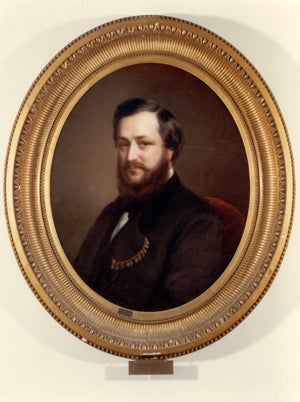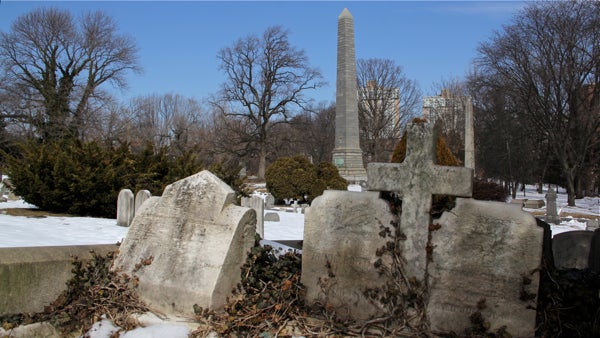The Philly dentist who helped fix Napoleon III’s bad tooth
Listen-

-

\The Woodlands cemetery in West Philadelphia. (Emma Lee/WHYY)
-

The granite obelisk that marks the grave of Dr. Thomas William Evans is 90 feet tall. It is believed to be the tallest monument to a non-president in the country. (Emma Lee/WHYY)
How Thomas Evans served royalty and helped modernize dentistry.
Not every dentist gets to be Napoleon III’s dentist. That honor strangely enough fell upon a West Philadelphia kid, Thomas Evans, who earned fame, influence and a sizeable fortune by serving the mouths of 19th century royalty. His money would eventually pay for the Thomas Evans Building, home to the Penn Dental School on the corner of 40th and Spruce, a Gothic, stately structure celebrating its 100th birthday this month.
A fateful molar
The legend goes that Evans’ first patients were the neighborhood dogs of 37th Street. He would wrangle them into submission, then fill their little animal cavities with whatever was lying around, the young Quaker clearly plying his trade for the days when a human would let him do the same.
“He was very much one of those sort of extraordinary 19th century self-made men who had decided at a very young age that he wanted to be a dentist,” says Samuel Hughes, long-time Senior Editor of the Pennsylvania Gazette, who has written at length about Evans.
By the 1840s, the 20-something is now licensed and working in Lancaster, PA, where he specializes in gold fillings, the breakthrough material of the day. Evans’ skill and early success catches the attention of Cyrus Brewster, an American dentist living in Paris.
In 1847, Brewster offers Evans a job, setting up what would be a pivotal moment for the man, because a few years after arriving in Paris, one of Brewster’s patients, Napoleon III, is in some distress.
“Yeah, he had a bad tooth, a bad toothache, and was apparently very sensitive to pain,” says Hughes.
But Brewster? He’s nowhere to be found.
“Evans went in to see Napoleon, and Napoleon was very impressed with this young dentist who was also very caring, and was also very skillful, and also painless,” says Denis Kinane, Dean of UPenn’s Dental School.
“I think at that point, Napoleon III took him on as a confidant, and also took him on as his own dentist. So it was a tremendous opportunity for Evans, and he grabbed it with both hands.”
Napoleon III, nephew of Bonaparte, appoints Evans to be the official “Surgeon Dentist to the Emperor.” The title launches him into the sphere of royalty, where he begins treating the wealthy and famous of Europe.
This, all at a time, when dentists did not enjoy sterling reputations.
“There was an expression in those days, a French expression, ‘To lie like a dentist.’ So they were not held in very high repute,” says Hughes.
A dentist’s dentist
 Evans begins to single-handedly elevate the profession, in part by simply demanding that his patients treat him and other dentists with respect. This is a man, afterall, who has Napoleon’s backing.
Evans begins to single-handedly elevate the profession, in part by simply demanding that his patients treat him and other dentists with respect. This is a man, afterall, who has Napoleon’s backing.
Another factor was innovation: Evans was a pioneer in the use of Nitrous Oxide as an anaesthetic, and helped develop rubber-based dentures, as opposed to the expensive and uncomfortable metal varieties of the day.
His notoriety, across the continent, kept expanding, as did his wallet.
“He made a good deal of money as a dentist, but he probably made a lot more when they were rearranging Paris,” says Hughes.
The city at the time was taking new shape. The crowded medieval neighborhoods were on their way out, as grand boulevards and parks were being built around town. And like any decent government program, there was plenty of cash to be made.
“Well, he was probably one of the original insider traders,” says Kinane.
Evans would sit in on Napoleon’s meetings, getting the skinny on where to invest.
“[He] listened to the discussions and gave advice, and then also went out and bought tracts of land which the government was then going to build on,” he says.
Evans, in short order, is filthy rich. He starts buying up art, including several Manets who he knows personally. He takes on a mistress, renting her an apartment and a summer cottage. And there’s also diplomatic missions. With Napoleon’s support, he sails home in 1864 to meet with President Lincoln for an update on the Civil War, reporting back that the end of fighting was on the horizon.
“I think you could think of him as being, lets say, the 19th century version of Benjamin Franklin,” says Kinane. “Benjamin Franklin was in Paris and had a similar exciting life when he was there, and was involved with diplomacy with respect to the American War of Independence. And you can imagine that Evans did something similar when he was there in Paris 100 years afterwards.”
Put it in stone
Evans lived out his days in Paris, dying in 1897 at the age of 73. In his latter years, he thought hard about his legacy, and what to do with the $5 million he had in the bank. His will lays out two priorities.
The first is a proper gravesite back in America, and that’s what Jessica Baumert is showing off.
 Thomas Evans is buried in The Woodlands in West Philadelphia. (Emma Lee/WHYY)
Thomas Evans is buried in The Woodlands in West Philadelphia. (Emma Lee/WHYY)
“We can see it through the trees, we can kind of see it popping up through the trees,” she says, as her boots crack through the ice blanketing The Woodlands cemetery in West Philly.
Near the northern edge of the 53-acres, we come upon a 90-foot tall granite obelisk, believed to be the tallest monument in the country for a non-President. It dominates the space, surrounded by stonework and shaded by a towering tulip tree.
“I think it strikes everyone who sees it as arrogant,” jokes Baumert. “And people’s reactions are usually, ‘whose monument is this?’ And then I tell them, and they’re like, ‘hmm.’ Cause it is one thing to have somebody put up a monument after someone dies, like the Washington Monument.
“But to make the decision while you’re still alive that you want something that is this ostentatious built for yourself upon your death, is pretty arrogant.”
Before we cast off Evans as an egotist with no heart, though, lets remember priority number two, and that’s the Evans Building. Along with the obelisk, he left a sizable chunk of money to build a dental school and museum, which eventually finds a home on the corner of UPenn’s Campus.
During its 100 years, thousands of would-be dentists have mastered their trade inside the walls.
“I don’t think he was big on modesty,” says Kinane. “I actually think he did take himself quite seriously. But, good enough for him, because he did actually do a lot of dentistry, and he did do a lot for mankind in his life.”
Kinane says there’s plans to begin a complete restoration of the building later this year. Too bad Evans isn’t around to pay for it.
WHYY is your source for fact-based, in-depth journalism and information. As a nonprofit organization, we rely on financial support from readers like you. Please give today.



